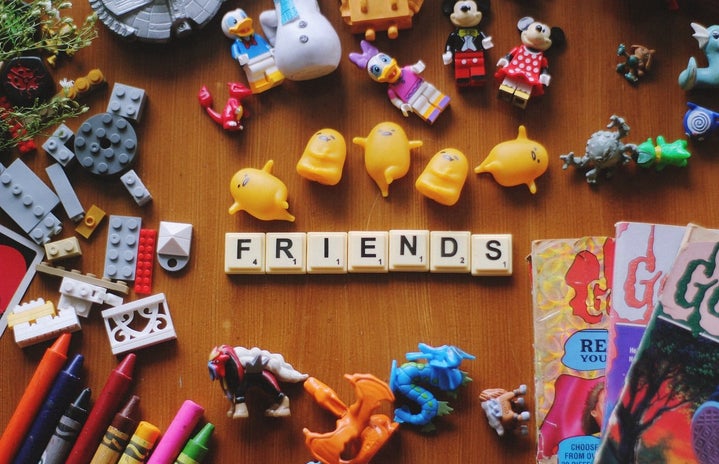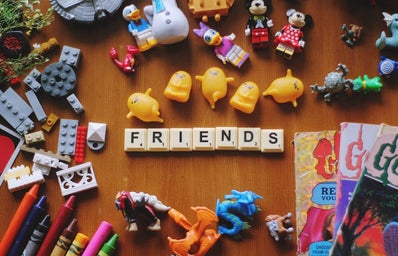We met when we were 11 years old. He was barely an inch taller than me and bore a strong resemblance to Captain America — before the super soldier serum. When I was with him, I felt understood. The longer we knew each other, the closer we got, and odds are if one of us was there, so was the other.
You probably have an image developing in your head. Maybe we were one of those couples that had a slowly escalating tension that their friends recognize before they do — the Gen-Z answer to Cory and Topanga. If that’s what you see in your mind’s eye, close it. I loved him, but never as anything but a brother. Christened by our classmates as “the Wonder Twins,” our friendship was the nucleus of our social cell in high school. Not only did we think we were solid, everyone else did too, from friends to parents to teachers to bullies.
After graduation, we tried to stay close. I started college. He became a barista. The free time I had and the free time he had went from a Venn diagram to two separate circles. Being distant allowed cracks into our foundation. The specifics aren’t important, but two of our close friends dated in high school and had a big, messy break up in college. Another of our friends ran away from home to California. Trying in vain to save a group dynamic that we’d already lost left us drained, and he started taking my calls less and less. I didn’t blame him; things weren’t the same anymore.
The more people I talked to, the more common I realized this was. One friend moves away, and their connection fades out. A woman gives birth to a child, and suddenly. she has little in common with her best friend. The relationship dies a slow, painful death before the friends process what’s happening. I’ve heard it said that friends are the family you choose, which is likely why friendships can have a profound impact on your life — and your health. Numerous studies exist on the impacts of socialization on health, and the overall consensus is that, whether you’re facing a cancer diagnosis or cardiovascular disease, having a good friend can make all the difference.
A study in the Journal of Clinical Oncology found that women diagnosed with breast cancer had a 66% increased risk of mortality if they were socially-isolated and double the risk of dying from cancer as opposed to women with a stronger support system. They also found that “being married was not significantly associated with reduced mortality,” which is “consistent with the notion that among women, the most important source of social support is often not the women’s spouses, but other significant network members.”
To say that the support of a friend is more important to a woman’s health than that of a man is untrue. According to The New York Times, a study of 736 middle-aged Swedish men determined their biggest risk factors for heart attacks and coronary disease were smoking and a lack of support, and men with a single attachment, such as a significant other, did not have a reduced risk, while those with friendships did.
Another study by the National Center for Biotechnology Information suggested that friendships are good for your heart — literally. The research followed sixty international students from the time they arrived in their host country to a few months later, with participants supplying information on their social lives and researchers evaluating their heart-rate variability, or how much time passes between each heartbeat. Overall, most students experienced a decrease in their heart-rate variability, though those who became more socially-integrated with time had higher heart-rate variability, which is suggested to lower the risk for the development of poor health.
It is hard to know what the correlation between health and friendship is. Friends can act as caregivers, but so can spouses or significant others. So why is the impact of having a friend so powerful?
“People with stronger friendship networks feel like there is someone they can turn to,” said Karen Roberto, director of the institute for society, culture and environment at Virginia Tech, to The New York Times. “Friendship is an undervalued resource. The consistent message of these studies is that friends make your life better.”
This brings the question: how do you keep a friendship from slipping away? For some, the answer is the same as if you feel a disconnect between yourself and your spouse: couples’ therapy. The notion of shelling out hundreds or thousands of dollars to save a friendship is extreme, but would it sound unusual to say that you’re in therapy with the most important person in your life? Sometimes you don’t want to start over with someone new; you want the friend you already have.
“I care about Sophie and that’s why I’m going to suggest to her that we have couples therapy. We have over 10 years of shared history together, and I don’t want to just walk away from that,” said an unnamed author for the BBC of her friendship. “She’s well-meaning, fun-loving and — even though I sometimes want to scream at her — still one of my favourite people to spend time with.”
As a kid in the era of Cory and Shawn, DJ and Kimmy, Will and Jazz, and even animated duos like Arnold and Gerald, I can understand the intrinsic desire to maintain lifelong friendships — that’s what we’ve grown up watching, after all. Even so, philosopher Friedrich Nietzsche created the metaphor of the “star friendship.”
“Stars are distant, like the friendships of yesteryear. They look bright, as you remember the good times. But the great thing about stars is that they don’t cast a shadow over you now,” explained Mark Vernon of The Guardian. “It holds out the hope that one day you will wake up and realise that you’re over the friendship, it was good, and all will be well.”
My lifelong mantra for friendship came from a little show you might have heard of, Boy Meets World: “Lose one friend, lose all friends, lose yourself.” While I don’t know if I still believe that, losing my best friend feels like losing a part of myself. I could sit around listening to Hey Monday and waiting for some kind of cosmic sign that we will go back to the way things were, or I could accept that our friendship is with the stars.


